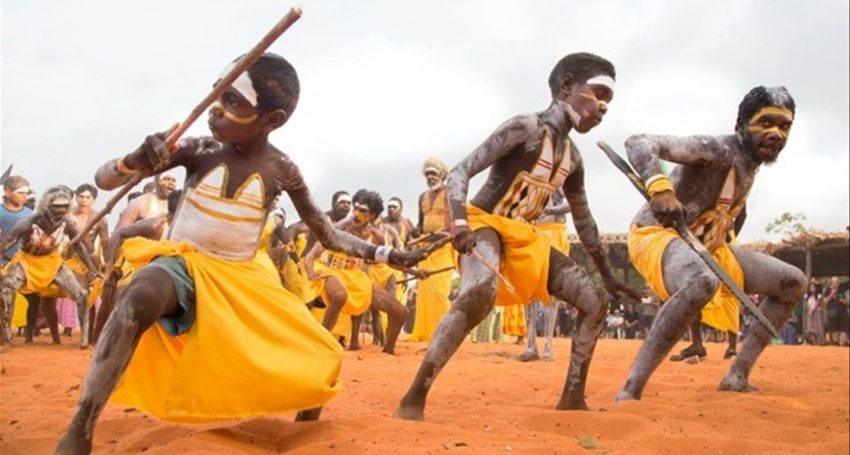Let the children come
Reflections
Bishop Jeremy Greaves invites us to learn from the Garma Festival’s intergenerational approach to ceremony and story telling

The Garma Festival of Traditional Cultures is an annual festival that is held in north-east Arnhem Land in the Northern Territory, Australia. It was held recently in October and is a celebration of the cultural inheritance of the Yolngu people, with the aim of sharing knowledge and culture. Each year, I watch highlights from the festival with great envy, wishing I was there amidst the dust and the flies to experience the celebrations firsthand.
I was particularly struck this year by an image of one of the dances during the festival. Amongst the adults was a single child doing his best to keep up, but fully a part of all that was going on.
The picture reminded me of something I recently read about children and worship; that is, ‘ “The children will now leave” will not be found in the rubrics of any prayer book, but is one of the most often used liturgical phrases in the Anglican Church’.
The photo of the Garma Festival shows that all are involved in ceremony. From the youngest to the oldest, there is a part to play: the children are not asked to leave because it is understood that only by playing their part will they learn the songs and stories of their community.
By naming 2018 as the ‘Year of Generations Together’, the Archbishop has invited us to think carefully about how we might better worship as the whole family of God. What if the best way for our children to learn the songs and stories of our faith communities was to include them in every part of our worship together?
Advertisement
The curious thing, of course, is that inter-generational, or all-age worship, is not a new thing. In fact, this was the way the church gathered for centuries: children and adults worshipped together. In a seamless transition from the marketplace to church, worship was a noisy, raucous affair with babies, children, adults and the elderly all together, engaging in different ways with different parts of the liturgy. Even in the early days of Sunday School, Sunday School generally happened before or after the Sunday service and did not replace children’s involvement in worship.
Theologian John Westerhoff, who has written extensively on faith development, says that if children can’t participate in our worship then we must change our worship! Another writer says that:
fundamentally, this means that children need to join the movement that has seen the liturgy truly become the work of all the people… children are not just recipients of what the worship experience offers, but are full participants. Anything an adult can do in worship a child could do as well.
So, perhaps it’s time to bring the children back, and there are a number of reasons for this.
Studies show that congregations that involve children in worship are more likely to experience significant growth. Congregations that focus efforts on attracting younger families and involve children in worship tend to see growth.
Another reason for thinking seriously about ‘generations together’ in worship is that it is simply the right thing to do if we are serious about the faith formation of our children. If children are going to learn how to worship, they will need to be in worship.
Advertisement
But, perhaps most importantly of all, the rest of the faith community will benefit from the sacramental presence of children. Children are a means of Grace in any congregation: they bring gifts that can take us by surprise, as they delight in being amongst us.
‘Jesus said, “Let the little children come to me, and do not hinder them, for the kingdom of God belongs to such as these”. And he took the children in his arms and blessed them (Mark 10:15-16).’






